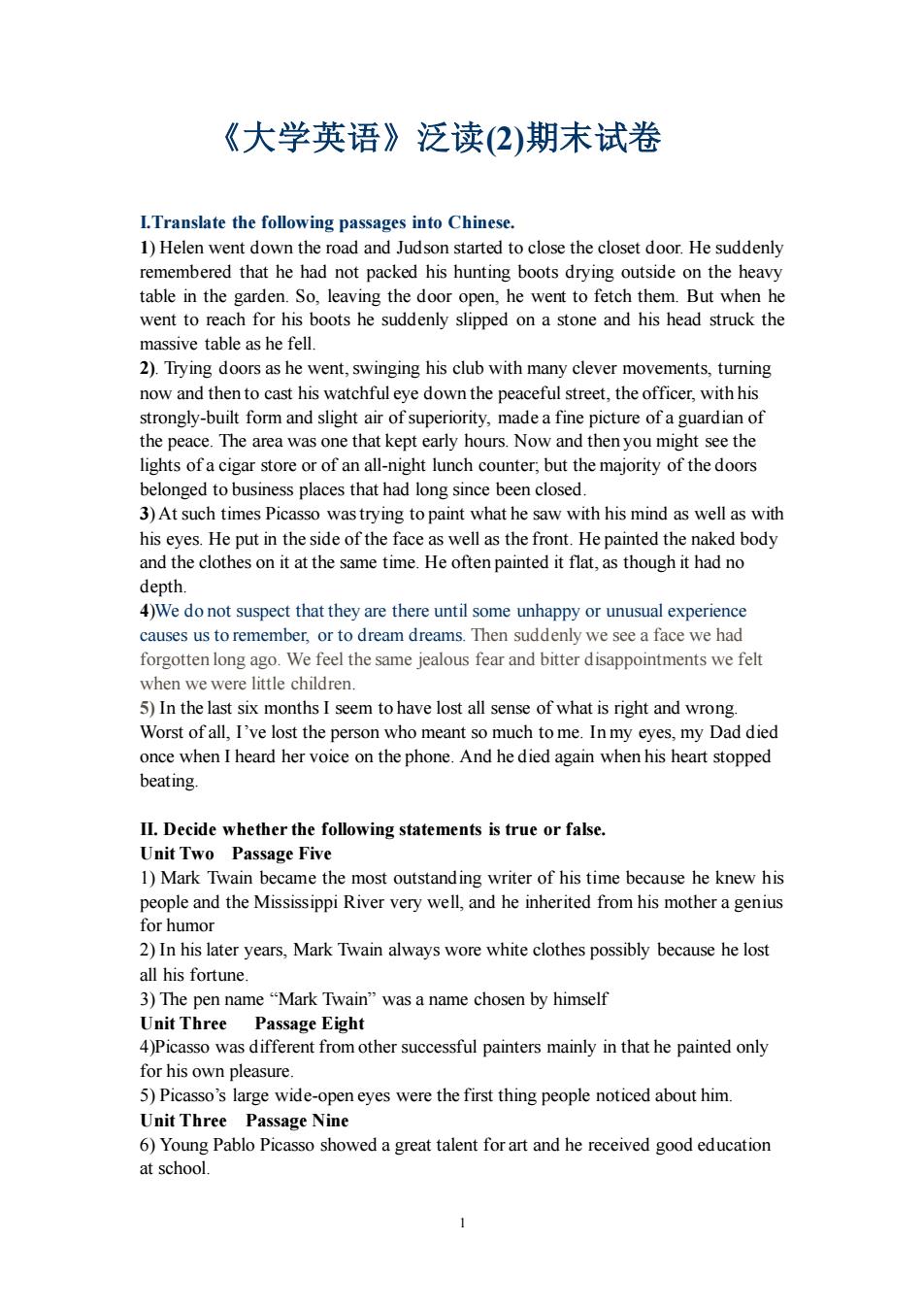
《大学英语》泛读(2)期末试卷 L.Translate the following passages into Chinese. 1)Helen went down the road and Judson started to close the closet door.He suddenly remembered that he had not packed his hunting boots drying outside on the heavy table in the garden.So,leaving the door open,he went to fetch them.But when he went to reach for his boots he suddenly slipped on a stone and his head struck the massive table as he fell. 2).Trying doors as he went,swinging his club with many clever movements,turning now and then to cast his watchful eye down the peaceful street,the officer,with his strongly-built form and slight air of superiority,made a fine picture of a guardian of the peace.The area was one that kept early hours.Now and then you might see the lights of a cigar store or of an all-night lunch counter,but the majority of the doors belonged to business places that had long since been closed. 3)At such times Picasso was trying to paint what he saw with his mind as well as with his eyes.He put in the side of the face as well as the front.He painted the naked body and the clothes on it at the same time.He often painted it flat,as though it had no depth. 4)We do not suspect that they are there until some unhappy or unusual experience causes us to remember,or to dream dreams.Then suddenly we see a face we had forgotten long ago.We feel the same jealous fear and bitter disappointments we felt when we were little children. 5)In the last six months I seem to have lost all sense of what is right and wrong. Worst of all,I've lost the person who meant so much to me.In my eyes,my Dad died once when I heard her voice on the phone.And he died again when his heart stopped beating. II.Decide whether the following statements is true or false. Unit Two Passage Five 1)Mark Twain became the most outstanding writer of his time because he knew his people and the Mississippi River very well,and he inherited from his mother a genius for humor 2)In his later years,Mark Twain always wore white clothes possibly because he lost all his fortune. 3)The pen name "Mark Twain"was a name chosen by himself Unit Three Passage Eight 4)Picasso was different from other successful painters mainly in that he painted only for his own pleasure. 5)Picasso's large wide-open eyes were the first thing people noticed about him. Unit Three Passage Nine 6)Young Pablo Picasso showed a great talent for art and he received good education at school
1 《大学英语》泛读(2)期末试卷 I.Translate the following passages into Chinese. 1) Helen went down the road and Judson started to close the closet door. He suddenly remembered that he had not packed his hunting boots drying outside on the heavy table in the garden. So, leaving the door open, he went to fetch them. But when he went to reach for his boots he suddenly slipped on a stone and his head struck the massive table as he fell. 2). Trying doors as he went, swinging his club with many clever movements, turning now and then to cast his watchful eye down the peaceful street, the officer, with his strongly-built form and slight air of superiority, made a fine picture of a guardian of the peace. The area was one that kept early hours. Now and then you might see the lights of a cigar store or of an all-night lunch counter; but the majority of the doors belonged to business places that had long since been closed. 3) At such times Picasso was trying to paint what he saw with his mind as well as with his eyes. He put in the side of the face as well as the front. He painted the naked body and the clothes on it at the same time. He often painted it flat, as though it had no depth. 4)We do not suspect that they are there until some unhappy or unusual experience causes us to remember, or to dream dreams. Then suddenly we see a face we had forgotten long ago. We feel the same jealous fear and bitter disappointments we felt when we were little children. 5) In the last six months I seem to have lost all sense of what is right and wrong. Worst of all, I’ve lost the person who meant so much to me. In my eyes, my Dad died once when I heard her voice on the phone. And he died again when his heart stopped beating. II. Decide whether the following statements is true or false. Unit Two Passage Five 1) Mark Twain became the most outstanding writer of his time because he knew his people and the Mississippi River very well, and he inherited from his mother a genius for humor 2) In his later years, Mark Twain always wore white clothes possibly because he lost all his fortune. 3) The pen name “Mark Twain” was a name chosen by himself Unit Three Passage Eight 4)Picasso was different from other successful painters mainly in that he painted only for his own pleasure. 5) Picasso’s large wide-open eyes were the first thing people noticed about him. Unit Three Passage Nine 6) Young Pablo Picasso showed a great talent for art and he received good education at school
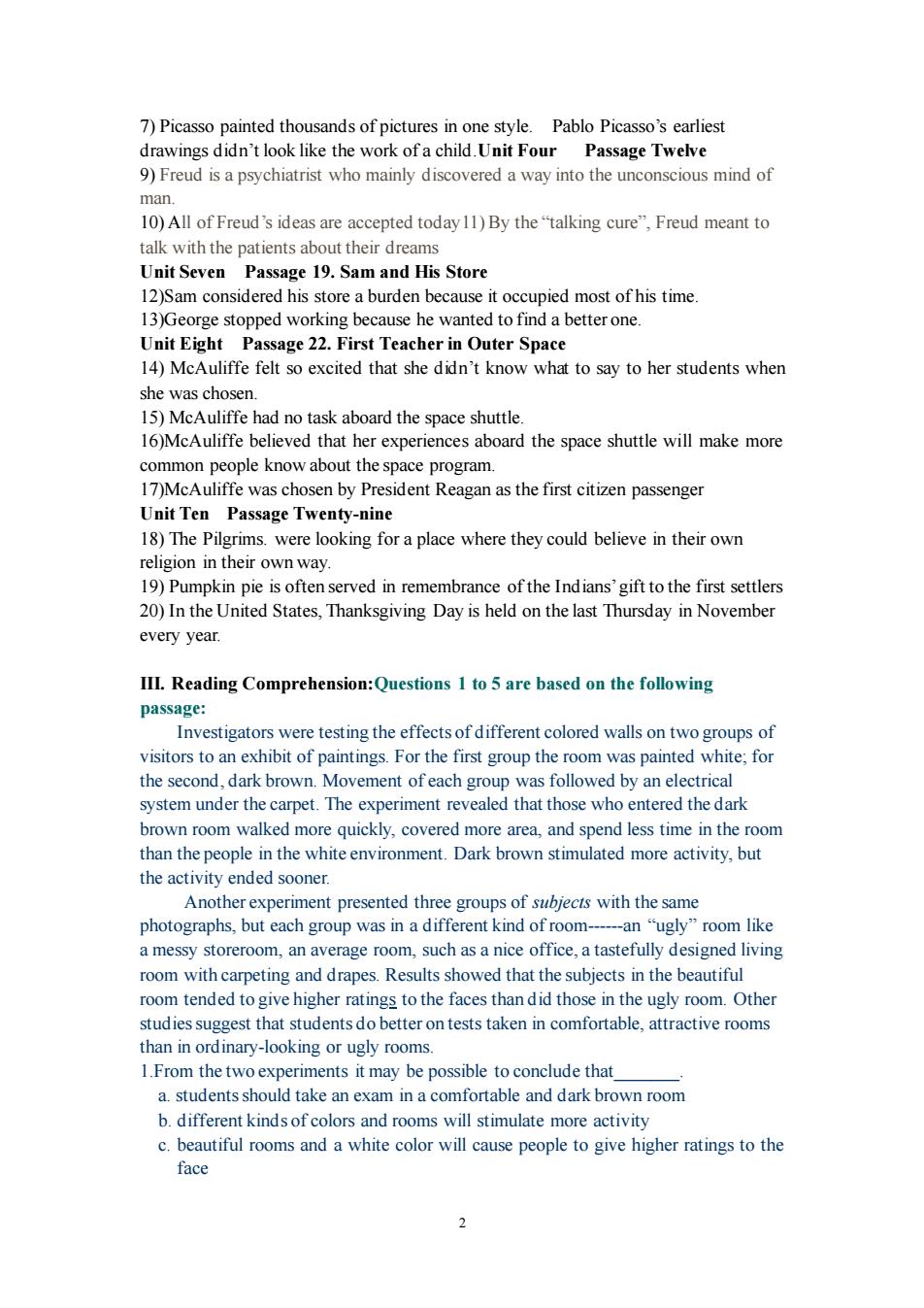
7)Picasso painted thousands of pictures in one style.Pablo Picasso's earliest drawings didn't look like the work of a child.Unit Four Passage Twelve 9)Freud is a psychiatrist who mainly discovered a way into the unconscious mind of man. 10)All of Freud's ideas are accepted today 11)By the"talking cure",Freud meant to talk with the patients about their dreams Unit Seven Passage 19.Sam and His Store 12)Sam considered his store a burden because it occupied most of his time 13)George stopped working because he wanted to find a better one. Unit Eight Passage 22.First Teacher in Outer Space 14)McAuliffe felt so excited that she didn't know what to say to her students when she was chosen. 15)McAuliffe had no task aboard the space shuttle. 16)McAuliffe believed that her experiences aboard the space shuttle will make more common people know about the space program. 17)McAuliffe was chosen by President Reagan as the first citizen passenger Unit Ten Passage Twenty-nine 18)The Pilgrims.were looking for a place where they could believe in their own religion in their own way. 19)Pumpkin pie is often served in remembrance of the Indians'gift to the first settlers 20)In the United States,Thanksgiving Day is held on the last Thursday in November every year. III.Reading Comprehension:Questions 1 to 5 are based on the following passage: Investigators were testing the effects of different colored walls on two groups of visitors to an exhibit of paintings.For the first group the room was painted white;for the second,dark brown.Movement of each group was followed by an electrical system under the carpet.The experiment revealed that those who entered the dark brown room walked more quickly,covered more area,and spend less time in the room than the people in the white environment.Dark brown stimulated more activity,but the activity ended sooner. Another experiment presented three groups of subjects with the same photographs,but each group was in a different kind of room------an"ugly"room like a messy storeroom,an average room,such as a nice office,a tastefully designed living room with carpeting and drapes.Results showed that the subjects in the beautiful room tended to give higher ratings to the faces than did those in the ugly room.Other studies suggest that students do better on tests taken in comfortable,attractive rooms than in ordinary-looking or ugly rooms. 1.From the two experiments it may be possible to conclude that a.students should take an exam in a comfortable and dark brown room b.different kinds of colors and rooms will stimulate more activity c.beautiful rooms and a white color will cause people to give higher ratings to the face
2 7) Picasso painted thousands of pictures in one style. Pablo Picasso’s earliest drawings didn’t look like the work of a child.Unit Four Passage Twelve 9) Freud is a psychiatrist who mainly discovered a way into the unconscious mind of man. 10) All of Freud’s ideas are accepted today11) By the “talking cure”, Freud meant to talk with the patients about their dreams Unit Seven Passage 19. Sam and His Store 12)Sam considered his store a burden because it occupied most of his time. 13)George stopped working because he wanted to find a better one. Unit Eight Passage 22. First Teacher in Outer Space 14) McAuliffe felt so excited that she didn’t know what to say to her students when she was chosen. 15) McAuliffe had no task aboard the space shuttle. 16)McAuliffe believed that her experiences aboard the space shuttle will make more common people know about the space program. 17)McAuliffe was chosen by President Reagan as the first citizen passenger Unit Ten Passage Twenty-nine 18) The Pilgrims. were looking for a place where they could believe in their own religion in their own way. 19) Pumpkin pie is often served in remembrance of the Indians’ gift to the first settlers 20) In the United States, Thanksgiving Day is held on the last Thursday in November every year. III. Reading Comprehension:Questions 1 to 5 are based on the following passage: Investigators were testing the effects of different colored walls on two groups of visitors to an exhibit of paintings. For the first group the room was painted white; for the second, dark brown. Movement of each group was followed by an electrical system under the carpet. The experiment revealed that those who entered the dark brown room walked more quickly, covered more area, and spend less time in the room than the people in the white environment. Dark brown stimulated more activity, but the activity ended sooner. Another experiment presented three groups of subjects with the same photographs, but each group was in a different kind of room------an “ugly” room like a messy storeroom, an average room, such as a nice office, a tastefully designed living room with carpeting and drapes. Results showed that the subjects in the beautiful room tended to give higher ratings to the faces than did those in the ugly room. Other studies suggest that students do better on tests taken in comfortable, attractive rooms than in ordinary-looking or ugly rooms. 1.From the two experiments it may be possible to conclude that_______. a. students should take an exam in a comfortable and dark brown room b. different kinds of colors and rooms will stimulate more activity c. beautiful rooms and a white color will cause people to give higher ratings to the face

d.environment will have effects on the people's movement 2.Compared with the people in the dark brown room,the people in the white room will a.spend less time b.become more active c.stay longer d.look forward to being out 3.Beautiful rooms will eventually a.make people cover more area b.encourage people to walk faster c.make the subjects more beautiful d.influence students'marks 4.In line 1,par2,the word“subjects'”means a.courses to be studied b.topics to be discussed c.persons to be experimented with d.students to be examined 5.Which statement best expresses the main idea of the passage? a.Not only colors but also room's appearances communicates and influences those inside. b.Investigators have studied the effects of the color of a room on people's behavior. c.Beautifully decorated,light-colored rooms make people more comfortable than ugly,dark rooms. d.People in beautiful rooms tend to give higher ratings to the faces than people in ugly rooms. Questions 6 to 10 are based on the following passage: Why don't birds get lost on their long flight from one place to another?Scientists have puzzled over this question for many years.Now they're beginning to fill in the blanks. Not long ago,experiments showed that birds rely on the sun to guide them during daylight hours.But what about birds that fly at night Tests with artificial stars have proved that certain night-flying birds are to follow the star on their long-distance flights. A dove had spent its lifetime in a cage and had never flown under a natural sky. Yet it showed an inborn ability to use the stars for guidance.The bird's cage was placed under an artificial star-filled sky.The bird tried to fly in the same direction as that taken by his outdoor cousins.Any change in the position of the makebelieve stars caused a change in the direction of his flight. Scientists think that doves,when flying in daylight,use the sun for guidance.But the stars are apparently their principal means of navigation.What do they do when the stars are hidden by clouds Apparently,they find their way by such landmarks as mountain ranges,coast lines,and river courses.But when it's too dark to see these, the doves circle helplessly,unable to get their bearings. 6.The reason why birds don't get lost on long flights
3 d. environment will have effects on the people’s movement 2.Compared with the people in the dark brown room, the people in the white room will_________. a. spend less time b. become more active c. stay longer d. look forward to being out 3.Beautiful rooms will eventually_______. a. make people cover more area b. encourage people to walk faster c. make the subjects more beautiful d. influence students’ marks 4.In line 1, par2, the word “subjects” means _____. a. courses to be studied b. topics to be discussed c. persons to be experimented with d. students to be examined 5.Which statement best expresses the main idea of the passage? a. Not only colors but also room’s appearances communicates and influences those inside. b. Investigators have studied the effects of the color of a room on people’s behavior. c. Beautifully decorated, light-colored rooms make people more comfortable than ugly, dark rooms. d. People in beautiful rooms tend to give higher ratings to the faces than people in ugly rooms. Questions 6 to 10 are based on the following passage: Why don’t birds get lost on their long flight from one place to another? Scientists have puzzled over this question for many years. Now they’re beginning to fill in the blanks. Not long ago, experiments showed that birds rely on the sun to guide them during daylight hours. But what about birds that fly at night ? Tests with artificial stars have proved that certain night-flying birds are to follow the star on their long-distance flights. A dove had spent its lifetime in a cage and had never flown under a natural sky. Yet it showed an inborn ability to use the stars for guidance. The bird’s cage was placed under an artificial star-filled sky. The bird tried to fly in the same direction as that taken by his outdoor cousins. Any change in the position of the makebelieve stars caused a change in the direction of his flight. Scientists think that doves, when flying in daylight, use the sun for guidance. But the stars are apparently their principal means of navigation. What do they do when the stars are hidden by clouds ? Apparently, they find their way by such landmarks as mountain ranges, coast lines, and river courses. But when it’s too dark to see these, the doves circle helplessly, unable to get their bearings. 6. The reason why birds don’t get lost on long flights________
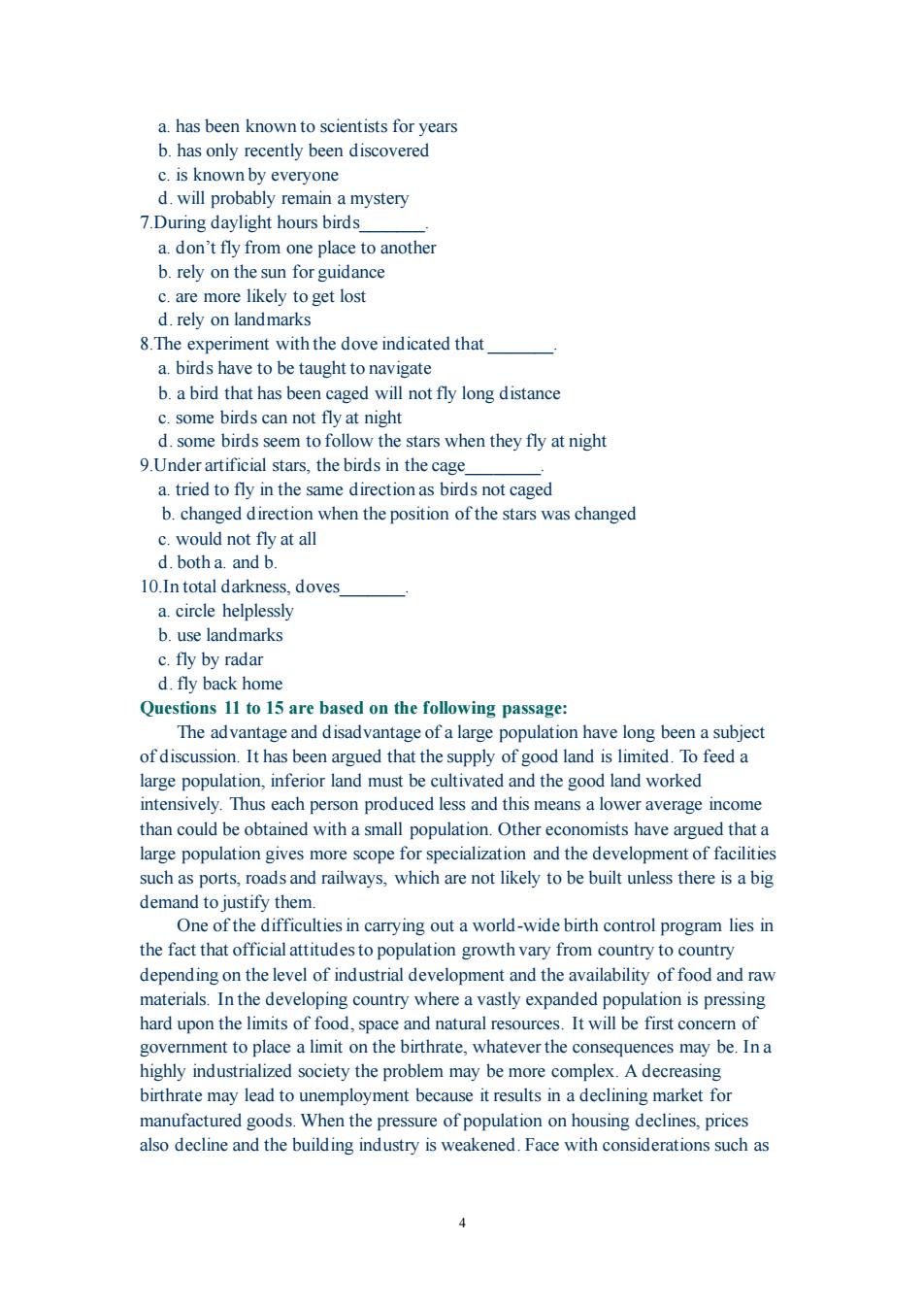
a.has been known to scientists for years b.has only recently been discovered c.is known by everyone d.will probably remain a mystery 7.During daylight hours birds a.don't fly from one place to another b.rely on the sun for guidance c.are more likely to get lost d.rely on landmarks 8.The experiment with the dove indicated that a.birds have to be taught to navigate b.a bird that has been caged will not fly long distance c.some birds can not fly at night d.some birds seem to follow the stars when they fly at night 9.Under artificial stars,the birds in the cage a.tried to fly in the same direction as birds not caged b.changed direction when the position of the stars was changed c.would not fly at all d.both a.and b. 10.In total darkness,doves a.circle helplessly b.use landmarks c.fly by radar d.fly back home Questions 11 to 15 are based on the following passage: The advantage and disadvantage of a large population have long been a subject of discussion.It has been argued that the supply of good land is limited.To feed a large population,inferior land must be cultivated and the good land worked intensively.Thus each person produced less and this means a lower average income than could be obtained with a small population.Other economists have argued that a large population gives more scope for specialization and the development of facilities such as ports,roads and railways,which are not likely to be built unless there is a big demand to justify them. One of the difficulties in carrying out a world-wide birth control program lies in the fact that official attitudes to population growth vary from country to country depending on the level of industrial development and the availability of food and raw materials.In the developing country where a vastly expanded population is pressing hard upon the limits of food,space and natural resources.It will be first concern of government to place a limit on the birthrate,whatever the consequences may be.In a highly industrialized society the problem may be more complex.A decreasing birthrate may lead to unemployment because it results in a declining market for manufactured goods.When the pressure of population on housing declines,prices also decline and the building industry is weakened.Face with considerations such as
4 a. has been known to scientists for years b. has only recently been discovered c. is known by everyone d. will probably remain a mystery 7.During daylight hours birds_______. a. don’t fly from one place to another b. rely on the sun for guidance c. are more likely to get lost d. rely on landmarks 8.The experiment with the dove indicated that _______. a. birds have to be taught to navigate b. a bird that has been caged will not fly long distance c. some birds can not fly at night d. some birds seem to follow the stars when they fly at night 9.Under artificial stars, the birds in the cage________. a. tried to fly in the same direction as birds not caged b. changed direction when the position of the stars was changed c. would not fly at all d. both a. and b. 10.In total darkness, doves_______. a. circle helplessly b. use landmarks c. fly by radar d. fly back home Questions 11 to 15 are based on the following passage: The advantage and disadvantage of a large population have long been a subject of discussion. It has been argued that the supply of good land is limited. To feed a large population, inferior land must be cultivated and the good land worked intensively. Thus each person produced less and this means a lower average income than could be obtained with a small population. Other economists have argued that a large population gives more scope for specialization and the development of facilities such as ports, roads and railways, which are not likely to be built unless there is a big demand to justify them. One of the difficulties in carrying out a world-wide birth control program lies in the fact that official attitudes to population growth vary from country to country depending on the level of industrial development and the availability of food and raw materials. In the developing country where a vastly expanded population is pressing hard upon the limits of food, space and natural resources. It will be first concern of government to place a limit on the birthrate, whatever the consequences may be. In a highly industrialized society the problem may be more complex. A decreasing birthrate may lead to unemployment because it results in a declining market for manufactured goods. When the pressure of population on housing declines, prices also decline and the building industry is weakened. Face with considerations such as
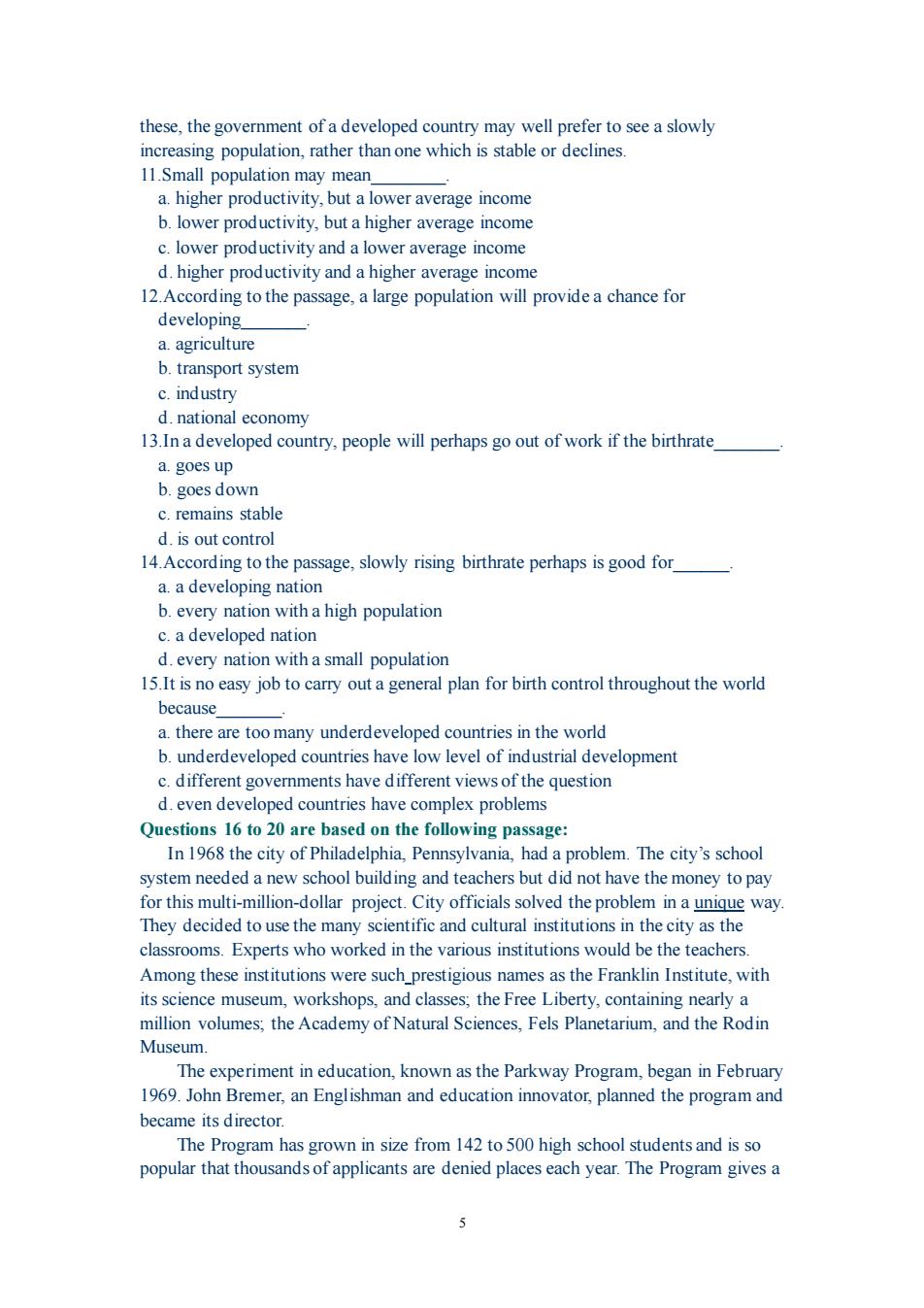
these,the government of a developed country may well prefer to see a slowly increasing population,rather than one which is stable or declines. 11.Small population may mean a.higher productivity,but a lower average income b.lower productivity,but a higher average income c.lower productivity and a lower average income d.higher productivity and a higher average income 12.According to the passage,a large population will provide a chance for developing a.agriculture b.transport system c.industry d.national economy 13.In a developed country,people will perhaps go out of work if the birthrate a.goes up b.goes down c.remains stable d.is out control 14.According to the passage,slowly rising birthrate perhaps is good for_ a.a developing nation b.every nation with a high population c.a developed nation d.every nation with a small population 15.It is no easy job to carry out a general plan for birth control throughout the world because a.there are too many underdeveloped countries in the world b.underdeveloped countries have low level of industrial development c.different governments have different views of the question d.even developed countries have complex problems Questions 16 to 20 are based on the following passage: In 1968 the city of Philadelphia,Pennsylvania,had a problem.The city's school system needed a new school building and teachers but did not have the money to pay for this multi-million-dollar project.City officials solved the problem in a unique way. They decided to use the many scientific and cultural institutions in the city as the classrooms.Experts who worked in the various institutions would be the teachers Among these institutions were such_prestigious names as the Franklin Institute,with its science museum,workshops,and classes;the Free Liberty,containing nearly a million volumes;the Academy of Natural Sciences,Fels Planetarium,and the Rodin Museum. The experiment in education,known as the Parkway Program,began in February 1969.John Bremer,an Englishman and education innovator,planned the program and became its director. The Program has grown in size from 142 to 500 high school students and is so popular that thousands of applicants are denied places each year.The Program gives a
5 these, the government of a developed country may well prefer to see a slowly increasing population, rather than one which is stable or declines. 11.Small population may mean________. a. higher productivity, but a lower average income b. lower productivity, but a higher average income c. lower productivity and a lower average income d. higher productivity and a higher average income 12.According to the passage, a large population will provide a chance for developing_______. a. agriculture b. transport system c. industry d. national economy 13.In a developed country, people will perhaps go out of work if the birthrate_______. a. goes up b. goes down c. remains stable d. is out control 14.According to the passage, slowly rising birthrate perhaps is good for______. a. a developing nation b. every nation with a high population c. a developed nation d. every nation with a small population 15.It is no easy job to carry out a general plan for birth control throughout the world because_______. a. there are too many underdeveloped countries in the world b. underdeveloped countries have low level of industrial development c. different governments have different views of the question d. even developed countries have complex problems Questions 16 to 20 are based on the following passage: In 1968 the city of Philadelphia, Pennsylvania, had a problem. The city’s school system needed a new school building and teachers but did not have the money to pay for this multi-million-dollar project. City officials solved the problem in a unique way. They decided to use the many scientific and cultural institutions in the city as the classrooms. Experts who worked in the various institutions would be the teachers. Among these institutions were such prestigious names as the Franklin Institute, with its science museum, workshops, and classes; the Free Liberty, containing nearly a million volumes; the Academy of Natural Sciences, Fels Planetarium, and the Rodin Museum. The experiment in education, known as the Parkway Program, began in February 1969. John Bremer, an Englishman and education innovator, planned the program and became its director. The Program has grown in size from 142 to 500 high school students and is so popular that thousands of applicants are denied places each year. The Program gives a

freedom to high school education never known before.To supplement basic courses required for a diploma---languages,history,science---students may choose from more than a hundred other courses.Any subject will be offered if an instructor can be found. Every group of 15 boys and girls belongs to a"tutorial group",led by a teacher and one assistant.Students in the Program say that school is no longer a place but an interesting activity. About 100 institutions in Philadelphia---public,private,commercial---help the Program.During any one week students may be found in such diverse places as a bakery,a church or the municipal gas plant.Such places merely provide space for classrooms.Other institutions such as the University of Pennsylvania or the Temple University Medical School allow the Program's own faculty to teach in their laboratories or other facilities.Other establishments provide both classroom space and instruction.One pharmaceutical-manufacturing company,for example,conducts a chemistry course. In addition to their studies,students are encouraged to take part-time jobs."The life of the city is our curriculum,"says Director Bremer."Life and learning are all part of the same process."Learning is excitement in this experimental program but it is not meant for every child.The student must be able to handle the freedom and self-discipline that the Program demands for academic success. 16.What was the problem Philadelphia had in 1968? a.Its school system needed a new school building b.More teachers were needed for its school system. c.It lacked money for its educational project. d.Both a and b. l7.The word“unique'”here means a."very unusual" b.“proper' c.“ordinary d.“pretty usual' 18.Who was the program planner? a.A famous English innovator. b.The director of a cultural institution c.An Englishman called John Bremer. d.Someone in charge of the city's school system. l9.E very“tutorial group”consists of a.a large group of children and their tutor b.15 boys and girls,a teacher and his assistant c.15 boys and 15 girls d.15 boys but no girls 20.About 100 institutions in Philadelphia a.provide space for classrooms b.open such courses as are required in the Program c.allow their laboratories and other facilities to be used d.offer their help 6
6 freedom to high school education never known before. To supplement basic courses required for a diploma---languages, history, science---students may choose from more than a hundred other courses. Any subject will be offered if an instructor can be found. Every group of 15 boys and girls belongs to a “tutorial group”, led by a teacher and one assistant. Students in the Program say that school is no longer a place but an interesting activity. About 100 institutions in Philadelphia---public, private, commercial---help the Program. During any one week students may be found in such diverse places as a bakery, a church or the municipal gas plant. Such places merely provide space for classrooms. Other institutions such as the University of Pennsylvania or the Temple University Medical School allow the Program’s own faculty to teach in their laboratories or other facilities. Other establishments provide both classroom space and instruction. One pharmaceutical-manufacturing company, for example, conducts a chemistry course. In addition to their studies, students are encouraged to take part-time jobs. “The life of the city is our curriculum,” says Director Bremer. “Life and learning are all part of the same process.” Learning is excitement in this experimental program but it is not meant for every child. The student must be able to handle the freedom and self-discipline that the Program demands for academic success. 16.What was the problem Philadelphia had in 1968? a. Itsschool system needed a new school building. b. More teachers were needed for its school system. c. It lacked money for its educational project. d. Both a and b. 17.The word“unique” here means_______. a.“very unusual” b.“proper” c.“ordinary” d. “pretty usual” 18.Who was the program planner? a. A famous English innovator. b. The director of a cultural institution. c. An Englishman called John Bremer. d. Someone in charge of the city’s school system. 19.E very “tutorial group” consists of_____. a. a large group of children and their tutor b.15 boys and girls, a teacher and his assistant c.15 boys and 15 girls d.15 boys but no girls 20.About 100 institutions in Philadelphia_______. a. provide space for classrooms b. open such courses as are required in the Program c. allow their laboratories and other facilities to be used d. offer their help
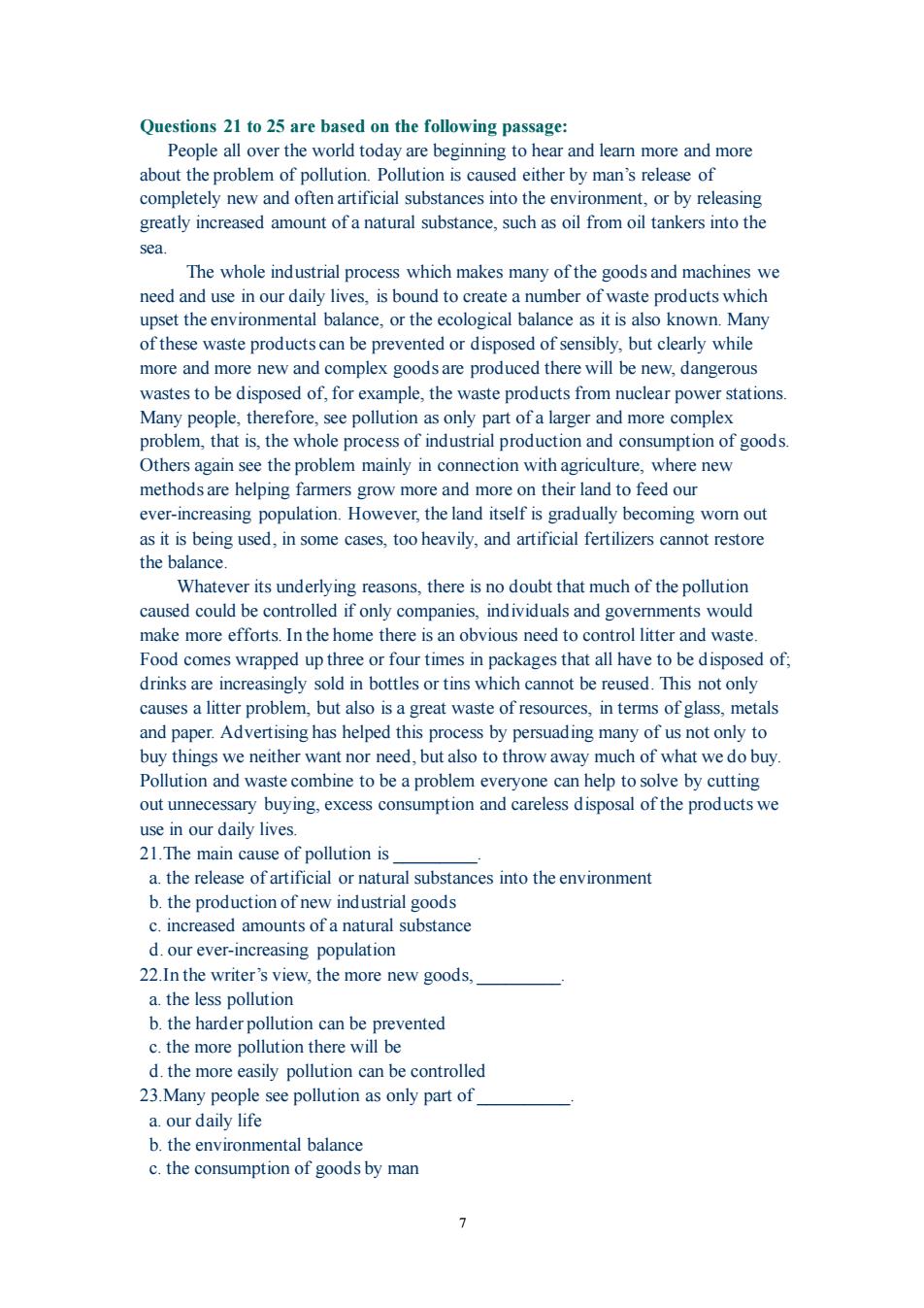
Questions 21 to 25 are based on the following passage: People all over the world today are beginning to hear and learn more and more about the problem of pollution.Pollution is caused either by man's release of completely new and often artificial substances into the environment,or by releasing greatly increased amount of a natural substance,such as oil from oil tankers into the sea. The whole industrial process which makes many of the goods and machines we need and use in our daily lives,is bound to create a number of waste products which upset the environmental balance,or the ecological balance as it is also known.Many of these waste products can be prevented or disposed of sensibly,but clearly while more and more new and complex goods are produced there will be new,dangerous wastes to be disposed of,for example,the waste products from nuclear power stations. Many people,therefore,see pollution as only part of a larger and more complex problem,that is,the whole process of industrial production and consumption of goods. Others again see the problem mainly in connection with agriculture,where new methods are helping farmers grow more and more on their land to feed our ever-increasing population.However,the land itself is gradually becoming worn out as it is being used,in some cases,too heavily,and artificial fertilizers cannot restore the balance. Whatever its underlying reasons,there is no doubt that much of the pollution caused could be controlled if only companies,individuals and governments would make more efforts.In the home there is an obvious need to control litter and waste Food comes wrapped up three or four times in packages that all have to be disposed of; drinks are increasingly sold in bottles or tins which cannot be reused.This not only causes a litter problem,but also is a great waste of resources,in terms of glass,metals and paper.Advertising has helped this process by persuading many of us not only to buy things we neither want nor need,but also to throw away much of what we do buy. Pollution and waste combine to be a problem everyone can help to solve by cutting out unnecessary buying,excess consumption and careless disposal of the products we use in our daily lives. 21.The main cause of pollution is a.the release of artificial or natural substances into the environment b.the production of new industrial goods c.increased amounts of a natural substance d.our ever-increasing population 22.In the writer's view,the more new goods, a.the less pollution b.the harder pollution can be prevented c.the more pollution there will be d.the more easily pollution can be controlled 23.Many people see pollution as only part of a.our daily life b.the environmental balance c.the consumption of goods by man >
7 Questions 21 to 25 are based on the following passage: People all over the world today are beginning to hear and learn more and more about the problem of pollution. Pollution is caused either by man’s release of completely new and often artificial substances into the environment, or by releasing greatly increased amount of a natural substance, such as oil from oil tankers into the sea. The whole industrial process which makes many of the goods and machines we need and use in our daily lives, is bound to create a number of waste products which upset the environmental balance, or the ecological balance as it is also known. Many of these waste products can be prevented or disposed of sensibly, but clearly while more and more new and complex goods are produced there will be new, dangerous wastes to be disposed of, for example, the waste products from nuclear power stations. Many people, therefore, see pollution as only part of a larger and more complex problem, that is, the whole process of industrial production and consumption of goods. Others again see the problem mainly in connection with agriculture, where new methods are helping farmers grow more and more on their land to feed our ever-increasing population. However, the land itself is gradually becoming worn out as it is being used, in some cases, too heavily, and artificial fertilizers cannot restore the balance. Whatever its underlying reasons, there is no doubt that much of the pollution caused could be controlled if only companies, individuals and governments would make more efforts. In the home there is an obvious need to control litter and waste. Food comes wrapped up three or four times in packages that all have to be disposed of; drinks are increasingly sold in bottles or tins which cannot be reused. This not only causes a litter problem, but also is a great waste of resources, in terms of glass, metals and paper. Advertising has helped this process by persuading many of us not only to buy things we neither want nor need, but also to throw away much of what we do buy. Pollution and waste combine to be a problem everyone can help to solve by cutting out unnecessary buying, excess consumption and careless disposal of the products we use in our daily lives. 21.The main cause of pollution is _________. a. the release of artificial or natural substances into the environment b. the production of new industrial goods c. increased amounts of a natural substance d. our ever-increasing population 22.In the writer’s view, the more new goods, _________. a. the less pollution b. the harder pollution can be prevented c. the more pollution there will be d. the more easily pollution can be controlled 23.Many people see pollution as only part of __________. a. our daily life b. the environmental balance c. the consumption of goods by man
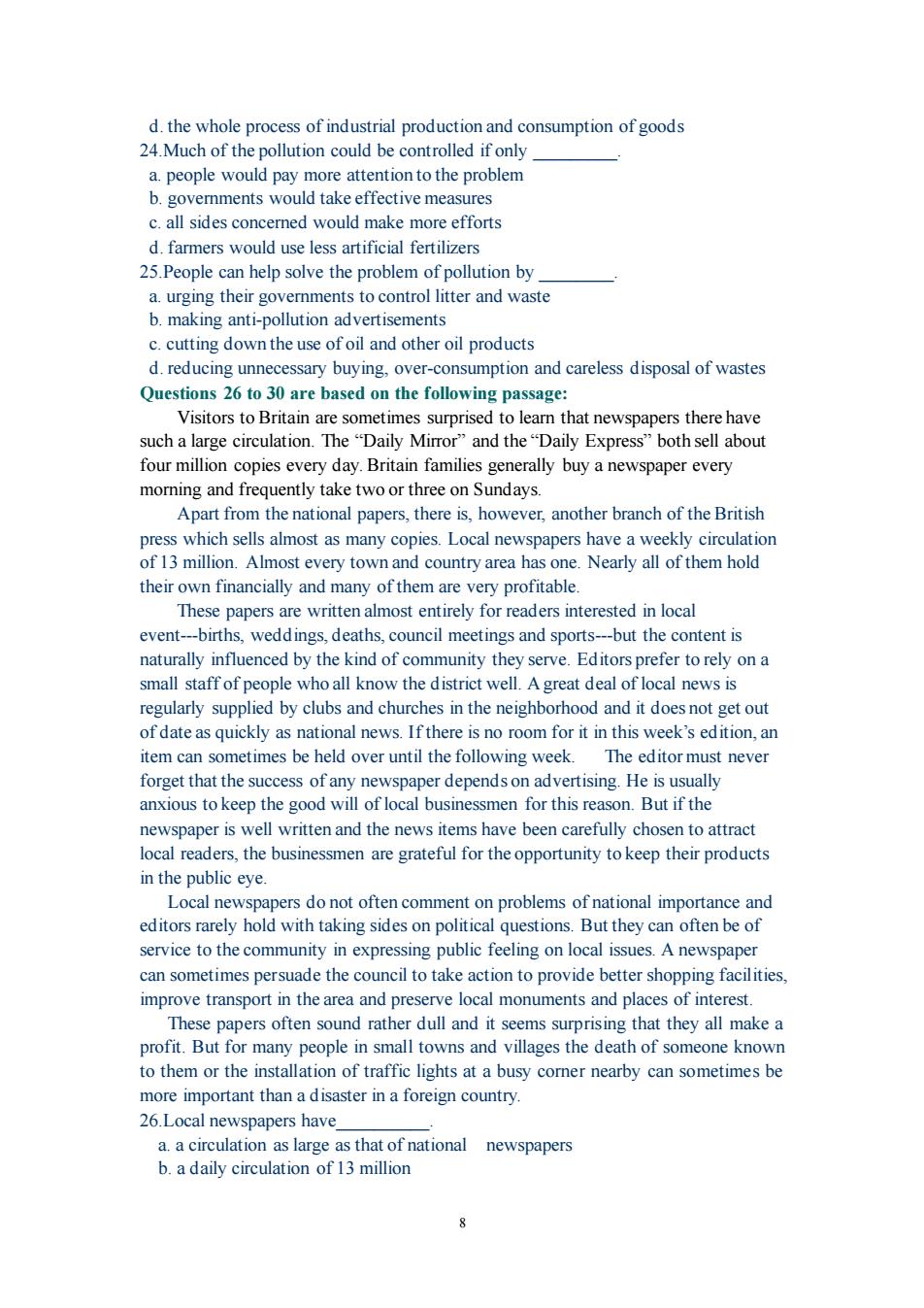
d.the whole process of industrial production and consumption of goods 24.Much of the pollution could be controlled if only a.people would pay more attention to the problem b.governments would take effective measures c.all sides concerned would make more efforts d.farmers would use less artificial fertilizers 25.People can help solve the problem of pollution by a.urging their governments to control litter and waste b.making anti-pollution advertisements c.cutting down the use of oil and other oil products d.reducing unnecessary buying,over-consumption and careless disposal of wastes Questions 26 to 30 are based on the following passage: Visitors to Britain are sometimes surprised to learn that newspapers there have such a large circulation.The "Daily Mirror"and the"Daily Express"both sell about four million copies every day.Britain families generally buy a newspaper every morning and frequently take two or three on Sundays. Apart from the national papers,there is,however,another branch of the British press which sells almost as many copies.Local newspapers have a weekly circulation of 13 million.Almost every town and country area has one.Nearly all of them hold their own financially and many of them are very profitable. These papers are written almost entirely for readers interested in local event---births,weddings,deaths,council meetings and sports---but the content is naturally influenced by the kind of community they serve.Editors prefer to rely on a small staff of people who all know the district well.A great deal of local news is regularly supplied by clubs and churches in the neighborhood and it does not get out of date as quickly as national news.If there is no room for it in this week's edition,an item can sometimes be held over until the following week.The editor must never forget that the success of any newspaper depends on advertising.He is usually anxious to keep the good will of local businessmen for this reason.But if the newspaper is well written and the news items have been carefully chosen to attract local readers,the businessmen are grateful for the opportunity to keep their products in the public eye Local newspapers do not often comment on problems of national importance and editors rarely hold with taking sides on political questions.But they can often be of service to the community in expressing public feeling on local issues.A newspaper can sometimes persuade the council to take action to provide better shopping facilities, improve transport in the area and preserve local monuments and places of interest These papers often sound rather dull and it seems surprising that they all make a profit.But for many people in small towns and villages the death of someone known to them or the installation of traffic lights at a busy corner nearby can sometimes be more important than a disaster in a foreign country. 26.Local newspapers have_ a.a circulation as large as that of national newspapers b.a daily circulation of 13 million
8 d. the whole process of industrial production and consumption of goods 24.Much of the pollution could be controlled if only _________. a. people would pay more attention to the problem b. governments would take effective measures c. all sides concerned would make more efforts d. farmers would use less artificial fertilizers 25.People can help solve the problem of pollution by ________. a. urging their governments to control litter and waste b. making anti-pollution advertisements c. cutting down the use of oil and other oil products d. reducing unnecessary buying, over-consumption and careless disposal of wastes Questions 26 to 30 are based on the following passage: Visitors to Britain are sometimes surprised to learn that newspapers there have such a large circulation. The “Daily Mirror” and the “Daily Express” both sell about four million copies every day. Britain families generally buy a newspaper every morning and frequently take two or three on Sundays. Apart from the national papers, there is, however, another branch of the British press which sells almost as many copies. Local newspapers have a weekly circulation of 13 million. Almost every town and country area has one. Nearly all of them hold their own financially and many of them are very profitable. These papers are written almost entirely for readers interested in local event---births, weddings, deaths, council meetings and sports---but the content is naturally influenced by the kind of community they serve. Editors prefer to rely on a small staff of people who all know the district well. A great deal of local news is regularly supplied by clubs and churches in the neighborhood and it does not get out of date as quickly as national news. If there is no room for it in this week’s edition, an item can sometimes be held over until the following week. The editor must never forget that the success of any newspaper depends on advertising. He is usually anxious to keep the good will of local businessmen for this reason. But if the newspaper is well written and the news items have been carefully chosen to attract local readers, the businessmen are grateful for the opportunity to keep their products in the public eye. Local newspapers do not often comment on problems of national importance and editors rarely hold with taking sides on political questions. But they can often be of service to the community in expressing public feeling on local issues. A newspaper can sometimes persuade the council to take action to provide better shopping facilities, improve transport in the area and preserve local monuments and places of interest. These papers often sound rather dull and it seems surprising that they all make a profit. But for many people in small towns and villages the death of someone known to them or the installation of traffic lights at a busy corner nearby can sometimes be more important than a disaster in a foreign country. 26.Local newspapers have__________. a. a circulation as large as that of national newspapers b. a daily circulation of 13 million
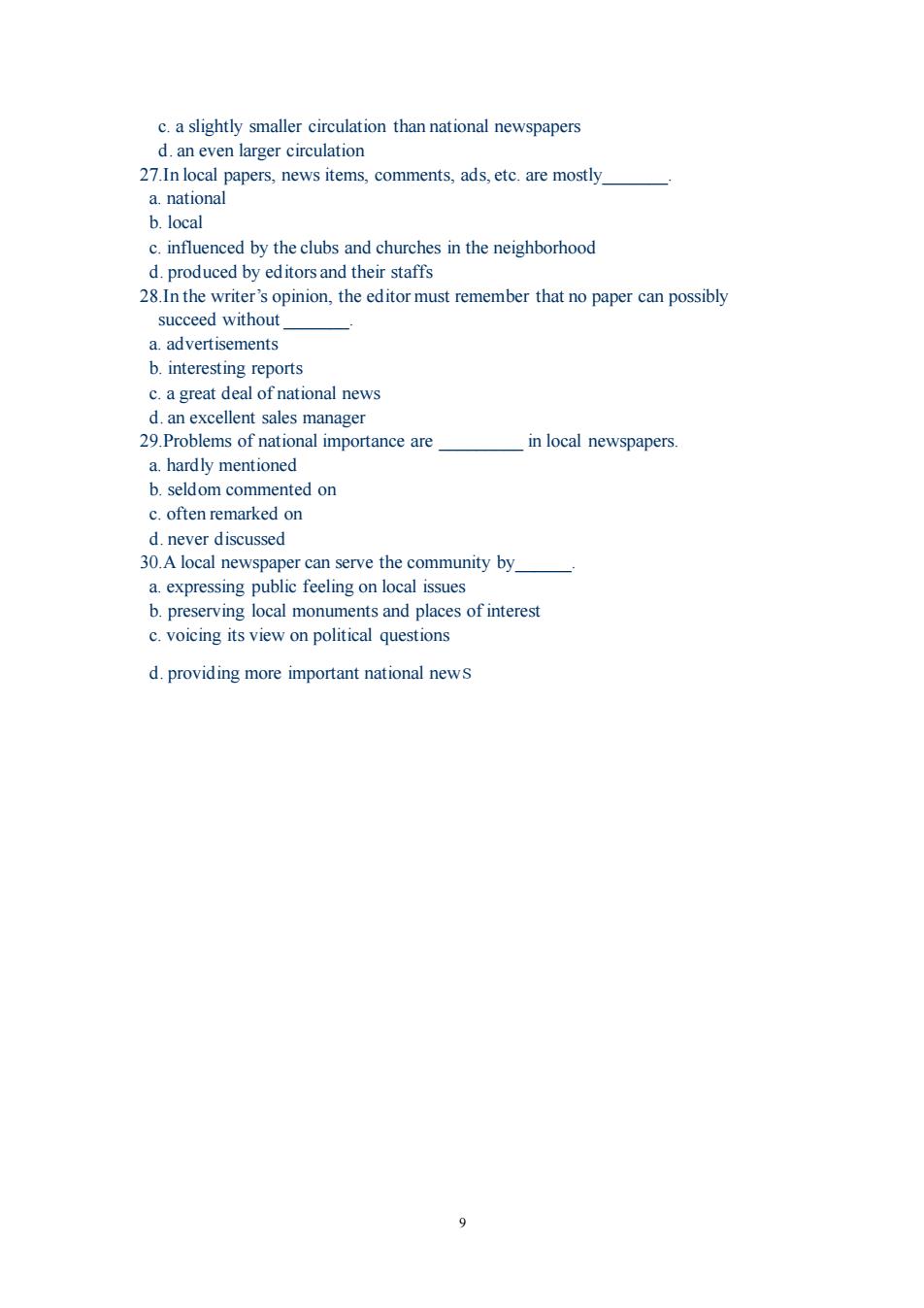
c.a slightly smaller circulation than national newspapers d.an even larger circulation 27.In local papers,news items,comments,ads,etc.are mostly a.national b.local c.influenced by the clubs and churches in the neighborhood d.produced by editors and their staffs 28.In the writer's opinion,the editor must remember that no paper can possibly succeed without a.advertisements b.interesting reports c.a great deal of national news d.an excellent sales manager 29.Problems of national importance are in local newspapers. a.hardly mentioned b.seldom commented on c.often remarked on d.never discussed 30.A local newspaper can serve the community by. a.expressing public feeling on local issues b.preserving local monuments and places of interest c.voicing its view on political questions d.providing more important national news
9 c. a slightly smaller circulation than national newspapers d. an even larger circulation 27.In local papers, news items, comments, ads, etc. are mostly_______. a. national b. local c. influenced by the clubs and churches in the neighborhood d. produced by editors and their staffs 28.In the writer’s opinion, the editor must remember that no paper can possibly succeed without _______. a. advertisements b. interesting reports c. a great deal of national news d. an excellent sales manager 29.Problems of national importance are _________ in local newspapers. a. hardly mentioned b. seldom commented on c. often remarked on d. never discussed 30.A local newspaper can serve the community by______. a. expressing public feeling on local issues b. preserving local monuments and places of interest c. voicing its view on political questions d. providing more important national news